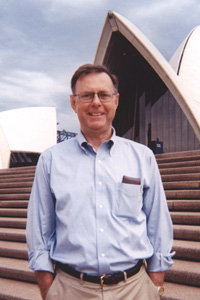 |
|
||
|
|||
Despite unrest, student interest in overseas programs is expanding
By Jessica Ullian
|
|
|
|
Students from BU’s Sydney Internship Program celebrating Australia Day in January 2003. The program is among more than 40 offered in 18 countries. |
|
Boston University’s leadership in study-abroad programs among American universities has a lengthy history — William Fairfield Warren, the school’s first president, reportedly set up exchange programs in Athens and Rome near the end of the 19th century. Since then the University has expanded its offerings considerably and even added some unconventional elements to the experience, such as the internships available for students in 10 foreign countries. Today, the Division of International Programs is dealing with new questions about safety and security overseas — but for some students, the perceived cultural clash provides more motivation to go.
“Anti-American sentiment overseas does not make me want to travel less,” says Kathryn Alison Brotzge (COM’05), who is currently studying in Australia at the Boston University Sydney Center. “It makes me want to travel more so I can meet people and change their perceptions of Americans. Personal interaction is the best way to change people’s minds.”
Brotzge’s way of thinking is reflected both at BU and around the country. International Programs is anticipating its highest enrollment ever this academic year — 1,900 students, from BU and other colleges and universities, are studying abroad through Boston University programs this year, and a record number have applied for next semester. Currently, there are more than 40 programs in 18 countries, and participants from more than 400 schools study abroad through BU. To keep pace with growing student interest, the University is expanding its international programs: one new addition, in Geneva, will begin in January, offering students internships in business and economics, nongovernmental organizations, and hospitality administration.
The Institute of International Education noted an 8 percent increase nationally in the number of American students studying abroad in the 2002-2003 academic year, as well as a growing interest in “less traditional” regions such as Korea, Japan, and the Czech Republic.
|
|
Urbain DeWinter, the associate provost for international programs, in front of the Sydney Opera House. Photo courtesy of International Programs |
|
A desire for travel and excitement informs the decision for most students, but BU participants are also finding that the study-abroad and internship programs actually help them discover new and exciting applications for their majors. Students can use their time overseas to learn a new language and explore a new city, but they can also take advantage of internships in journalism, film, or international relations, among other areas. In Belize, archaeology students participate in on-site excavations, while in London, musicians train at the prestigious Royal College of Music.
“Since 9/11, there’s a greater awareness of the need to better understand the world in which we live,” says Urbain DeWinter, associate provost for international programs. “What we’re seeing is not only an interest in study abroad in general, but an interest in placing their studies in an international context.”
For Brotzge, who is interning with Sydney’s Channel 9 on the Today Show, the opportunity to actually work in broadcast journalism clinched her decision to “get as far away from things as possible. I liked the idea of a placed internship with a reputable Australian organization,” she says.
Chris Anason (ENG’07) plans to spend next semester in Dresden. He chose his study-abroad program for similar reasons. “It was the only study-abroad program that I could participate in and still get credit towards my major,” he says. “Although I’m only a sophomore, I wanted to study abroad, especially in Europe, and this was my only opportunity.”
The International Programs office makes sure that participants are aware of personal safety issues, but neither Brotzge nor Anason is especially concerned. “From a security standpoint, I’m not at all worried,” Anason says. “The language barriers might be another issue.”
While security may not be a major concern for students, it has always been a priority for International Programs. The guidelines posted on its Web site advise students to “be as inconspicuous in dress and demeanor as possible” and “downplay the elements of your appearance and manner that broadcast that you are American.” The office also recommends avoiding “potential target areas for terrorist activities” in times of political conflict, and keeping clear of political demonstrations. Emergency preparations are thorough: the Boston office has 24-hour contact information for every location, and the resident staff in each city have contingency plans for situations “up to and including cancellation of the program.”
The plans were put to a rigorous test last March, when bombs exploded in Madrid’s commuter railway system, killing nearly 200 people and wounding more than 1,000 in the worst terrorist attack in recent European history. At the time, 95 students were spending the semester there through BU’s Madrid Language, Liberal Arts, and Internship Program. “Within 12 hours,” says DeWinter, “we knew that every one of those students was safe.”
Despite the unknown and the unpredictable, there are no plans to curtail the growth of the study-abroad program — nor, DeWinter says, is there any demand for such a change. “I think for most students,” he says, “this is one of the best experiences of their academic career.”
Brotzge agrees. “I am in a place that I never thought I would be living, studying, and working,” she says. “It has changed my life. I am different and better for it.”
![]()
19
November 2004
Boston University
Office of University Relations

